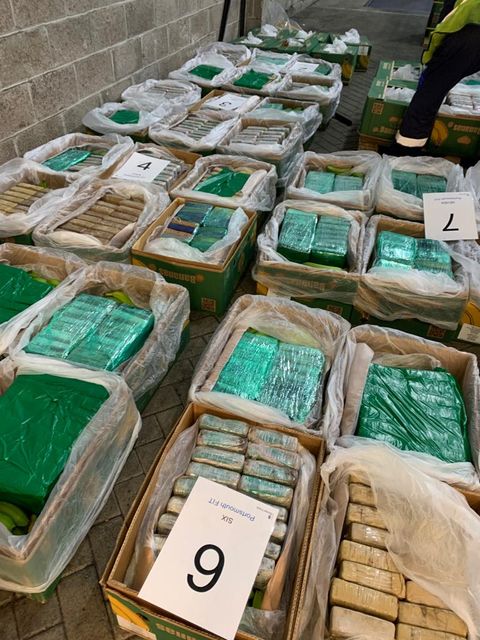A drug-smuggling gang has been jailed after cocaine with a street value of £200 million was intercepted in a shipment of bananas – making it the UK’s largest haul of the drugs at the time.
Crime boss Petko Zhutev was in charge of taking delivery of the Colombian drugs at a London warehouse in February 2021 – unaware it had already been seized by border officials at Portsmouth.
Midway through a retrial at the Old Bailey, Zhutev, 39, who entered the UK from Bulgaria in January 2021, admitted importation of a class A drug having previously been cleared of possession of a revolver and ammunition with intent to endanger life.
On Tuesday, he was jailed at the Old Bailey for 27 years alongside four others, after Judge Rebecca Trowler KC said he played a “leading role” in the importation.
The judge said Zhutev had committed previous offences, including making a fraudulent application for a Covid bounce back loan to a company in his name.
Border officials at Portsmouth uncovered 2,330 blocks of cocaine weighing 2.3 tonnes (NCA/PA)
Erik Muci, 45, of Haynes Road, Hornchurch, and Olsi Ebeja, 40, of Malta Street, Islington, were found guilty of importation at the conclusion of the retrial and were sentenced to 33 years’ and 17 years’ imprisonment respectively.
Muci, described by a judge as a “key organiser”, was jailed for 26 years for the importation and given a further consecutive sentence of seven years’ imprisonment for the supply of class A drugs, after police recovered 33kg of cocaine from a property on Caledonian Road, north London.
Judge Trowler said Muci, who had worked as a plumber since arriving into the UK as a refugee from Albania, was “organising the buying and selling of cocaine on a commercial scale”.
Judge Trowler said Ebeja, who was born in Kosovo and had worked as a waiter and a minicab driver since arriving in the UK in 1999, carried out an “operational function” in the enterprise, including as a driver.
Bruno Kuci, 32, who was born in Albania and came to the UK in December 2020, and Gjergji Diko, 34, of west Beckton, who were arrested with Zhutev, had previously pleaded guilty to the importation charges.
Kuci, described as a “trusted member of the operation”, was jailed for 21 years and Diko, who also moved to the UK from Albania and had worked as a mechanic, for 18 years.
Sentencing them on Tuesday, Judge Trowler said the importation was “plainly the work of an organised crime group with international elements”, adding the group had Bulgarian and Albanian elements.
Ms Trowler added: “The extremely large quantities of cocaine involved and the organisation required to bring such amounts into the UK from Colombia demonstrated beyond doubt that this enterprise was sophisticated in its planning and well resourced.”
The court had heard how port officials uncovered four pallets containing 2,330 blocks of the class A drug weighing 2.3 tonnes amid a consignment of 41 pallets of bananas from Colombia on February 14 2021.
Four days later, two covert officers posing as lorry drivers delivered the boxes to a warehouse in north London, having already switched the drugs for more bananas.
Zhutev used the cover of his role as director of a food importation business, Agro Food Ltd, to organise and set up the UK side of the criminal operation, jurors heard.
He was in charge when two lorries delivered the pallets of bananas, having secured the manpower to unpack, repackage and distribute the drugs hidden among the fruit, it was alleged.
Around two hours after the delivery on February 18, officers entered the warehouse and arrested three of the defendants.
Jurors were told that numbered pallets in which the drugs were transported had been identified and moved to a first floor where the process of searching them had started.
A revolver containing six live cartridges was recovered from a ceiling girder above the boxes.
Jurors were told the cocaine had a potential street value of at least £186 million, rising to £200 million when mixed with other substances, at the time making it the largest inland seizure ever by UK officers.
Judge Trowler said the “sophisticated” operation included specialist laminated glass being installed at the warehouse to limit visibility, as well as the use of hi-vis jackets to give the impression of a legitimate operation and Dutch sim phones to avoid detection.
